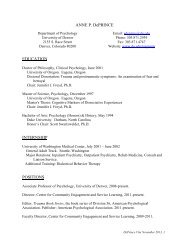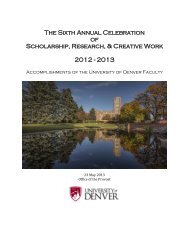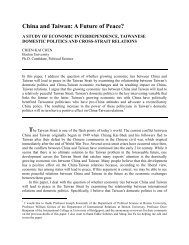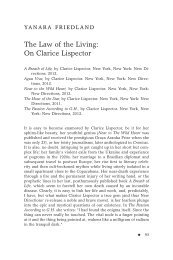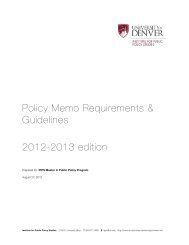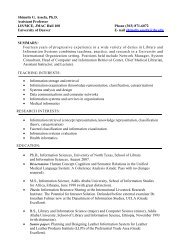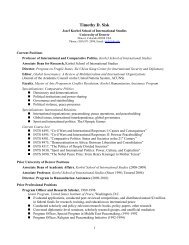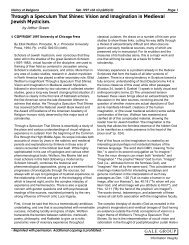You also want an ePaper? Increase the reach of your titles
YUMPU automatically turns print PDFs into web optimized ePapers that Google loves.
16 spring 12 where in the world is <strong>GSSW</strong>?<br />
Adjunct Pr<strong>of</strong>essor Sarah<br />
Bexell (center)<br />
with concentration<br />
year MSW students<br />
Kelsey Holmes<br />
and Samantha<br />
“Sam” Rabins<br />
<strong>GSSW</strong> in Sichuan Province,<br />
China: Conservation Social<br />
Work in Action<br />
by Research Scholar-in-Residence and<br />
Adjunct Pr<strong>of</strong>essor Sarah M. Bexell, PhD<br />
Institute for Human-Animal Connection<br />
I have worked for the past 12 years in Chengdu, the<br />
capitol <strong>of</strong> China’s Sichuan Province, with the Chengdu<br />
Research Base <strong>of</strong> Giant Panda Breeding. Throughout<br />
this time, my colleagues and I have forged strong<br />
relationships with pr<strong>of</strong>essors<br />
at Sichuan <strong>University</strong>, Sichuan<br />
Normal <strong>University</strong> and many<br />
international and domestic non-<br />
governmental organizations.<br />
Our aim is to better understand<br />
the human strain on the<br />
natural environment and how<br />
it impacts wildlife health and<br />
human health.<br />
In 2010 and 2011, I had the<br />
honor <strong>of</strong> taking <strong>GSSW</strong> students<br />
to China for six-week summer<br />
internships. Now we are pre-<br />
paring for another exciting<br />
summer <strong>of</strong> work and learning<br />
in Sichuan, and next year we’ll be <strong>of</strong>fering a new MSW<br />
service-learning course in addition to the internship.<br />
Entitled “Connecting Social and Environmental<br />
Sciences: Biodiversity Health and Ecological Systems in<br />
Southwest China,” the new course will focus on the<br />
rapidly growing field <strong>of</strong> conservation social work.<br />
China exhibits some <strong>of</strong> the world’s most severe<br />
biodiversity declines, with impacts on human<br />
health and social stability already prevalent. Both<br />
the internship and the new course are designed to<br />
introduce students to the social, economic, cultural,<br />
health, environmental and conservation issues <strong>of</strong><br />
urban and rural China. The students will have the<br />
opportunity to integrate hands-on research with<br />
service-learning projects and field work in the urban areas<br />
<strong>of</strong> Chengdu (a city <strong>of</strong> 14-million people) and remote areas<br />
<strong>of</strong> rural Sichuan Province. These experiences will allow the<br />
students to gain firsthand knowledge <strong>of</strong> the environmental<br />
and social challenges facing China and, in turn, the world.<br />
Today, no country operates in a bubble, especially when it<br />
comes to environmental concerns that impact human health<br />
globally: air, water and soil pollution, emerging infectious<br />
diseases, food security, dwindling natural resources and<br />
much more. As the fight for global health reaches a tipping<br />
point, I can barely contain my excitement about the critical<br />
partnerships that are developing between conservationists<br />
and social workers.<br />
The conservation community has been working for decades<br />
to turn the tide toward a healthier human presence in the<br />
world, but thus far has been working in vain. We desperately<br />
need partners in the social sciences, and especially in<br />
social work, community organizing and international social<br />
development, to help us better engage with all citizens to<br />
protect Earth, our life support system.<br />
The social work community is committed to human health<br />
and well-being, but without a healthy planet, it cannot fulfill<br />
its mission. I have great hope that, together, we can ensure<br />
a future for humanity by protecting our planet and the<br />
amazing others with whom we share our land and waters.<br />
Conserving Our Environment<br />
One Panda at a Time<br />
by Kelsey Holmes, concentration year MSW student<br />
After four airports, two flight delays, one briefly lost piece<br />
<strong>of</strong> luggage and just seconds to adjust to Chinese toilets, my<br />
MSW classmate Samantha Rabins and I finally arrived at<br />
Chengdu in China’s Sichuan Province. Earlier in the year,<br />
Sam and I separately applied for an internship that focused<br />
on vital conservation issues and their direct influence on<br />
human mental health. Our shared interests led us to Dr.<br />
Sarah Bexell, Director <strong>of</strong> Conservation Education at the<br />
Chengdu Research Base <strong>of</strong> Giant Panda Breeding. It was<br />
Where in theWorld is <strong>GSSW</strong>?<br />
cHina<br />
here that we would spend the next six weeks studying and<br />
educating others on these environmental issues.<br />
Waking up on our first day in Chengdu, Sam and I eagerly<br />
gazed out <strong>of</strong> our balcony window at the unfamiliar view<br />
below. It seemed as if all <strong>of</strong> the city’s 14-million people<br />
had gathered on the streets below! Mopeds, bicycles and<br />
walkers filled the sidewalks, while buses, trucks and taxis<br />
filled the streets. To our left was an elementary school filled<br />
with children; to our right, hotels and shops seemed to be<br />
popping up daily. Straight ahead, where we expected the<br />
mountains to be, there was nothing but smog—a logical<br />
result, considering all <strong>of</strong> the activity in this busy city.<br />
Although Chengdu is buzzing with people, it is also home<br />
to the Panda Research Base, a beautiful green escape from<br />
city life. Here the air seemed fresher, the sun brighter and<br />
the trees bigger. Sam and I were fortunate to be given the<br />
opportunity to work at the Base daily, with wonderful staff,<br />
educating English-speaking visitors about giant pandas<br />
and their close relationship to conservation issues. Our<br />
education hut was directly across from the enclosure for the<br />
one-year-old pandas, and we found their cuteness completely<br />
intoxicating: their cub-to-cub play dates, constant eating <strong>of</strong><br />
bamboo and talent for sleeping high up in a tree.<br />
To our surprise, the most common question we were asked<br />
was not, “Why are pandas so darn cute?” but rather “What<br />
are two social work students from the United States doing on<br />
a Panda Base in China?” Our answer was always the same:<br />
conservation. By conserving our environment, we explained,<br />
we can directly increase positive mental health in humans.<br />
Think about it: Aren’t you happier on a beautiful day when<br />
you can walk down the street or hike up a mountain while<br />
breathing clean air? Yet climate change, overpopulation,<br />
pollution, and fragmentation and loss <strong>of</strong> wildlife habitats<br />
are having devastating effects on our planet. By educating<br />
ourselves, and understanding the importance <strong>of</strong> “living<br />
lightly,” we can help reduce these negative impacts and try to<br />
rehabilitate the world.<br />
Learning about these important issues in an environment<br />
like Chengdu was a once-in-a-lifetime experience for both<br />
Sam and me. Our knowledge will help us improve our world<br />
so the next generation can enjoy it as much as we do.<br />
where in the world is <strong>GSSW</strong>? spring 12 17



